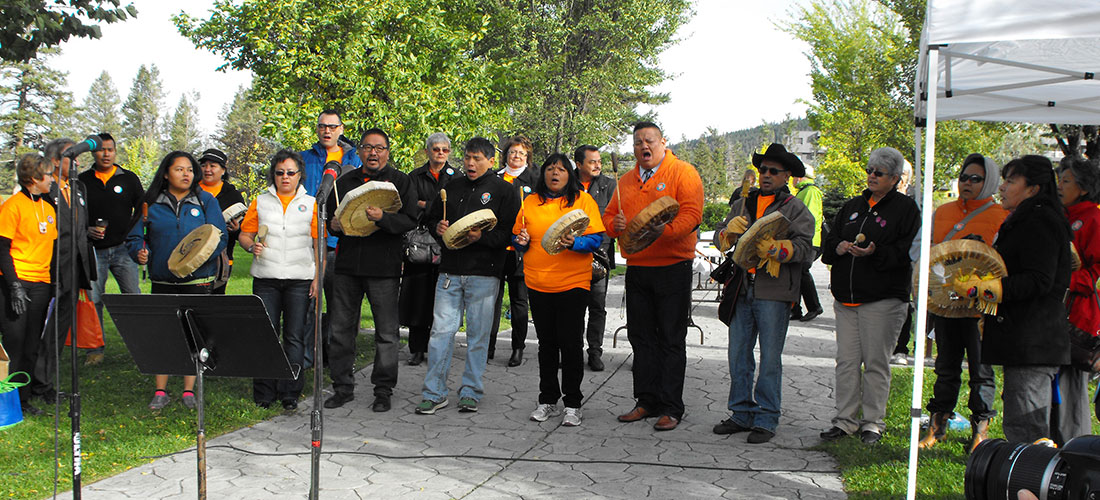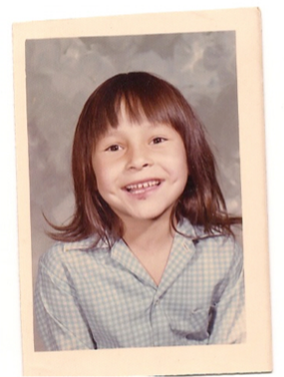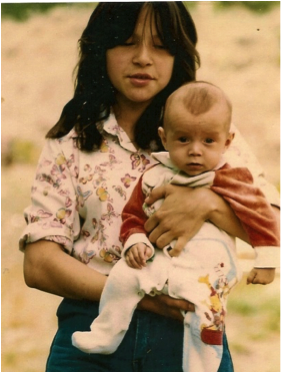National Day for Truth and Reconciliation
Land Acknowledgement
The Perth East Public Library would like to acknowledge that Municipality of Perth East is situated on the treaty lands of Anishinaabe. This acknowledgement demonstrates a commitment towards the pursue of truth as we move towards reconciliation, while honouring those that came before us and on whose traditional land we now reside.
According to the Gord Downie & Chanie Wenjack Fund, National Day for Truth and Reconciliaton is recognized on each September 30th. This day fullfills the Truth and Reconiliation Commission's Call to Action #80 and "will serve as a day of remembrance, reflection, action and learning" (Downie Wenjack Fund). Last year was the first year the holiday was enacted, however prior to this, beginning in 2013 September 30th was known and remains to be known as Orange Shirt Day, a day to recognize the tragic history and long-lasting effects of residential schools on Indigneous Peoples (Downie Wenjack Fund).
Truth and Reconciliation Call-to-Action #80: We call upon the federal government, in collaboration with Aboriginal peoples, to establish, as a statutory holiday, a National Day for Truth and Reconciliation to honour Survivors, their families, and communities, and ensure that public commemoration of the history and legacy of residential schools remains a vital component of the reconciliation process (Downie Wenjack Fund).
Orange Shirt Day was the predecessor of National Day of Truth and Reconciliation and is a grassroots movement, meaning that it was began by "ordinary people" opposed to government officials or large organizations.
As per the Orange Shirt Society, Orange Shirt Day is in recognition of the harm that the residential school system had to children's sense of self-esteem and well being, as as an affirmation of our committment to ensure that everyone around us matters (Orange Shirt Day).

The following story is of Phyllis Webstad and her experience going to a residential school:
I went to the Mission for one school year in 1973/1974. I had just turned 6 years old. I lived with my grandmother on the Dog Creek reserve. We never had very much money, but somehow my granny managed to buy me a new outfit to go to the Mission school. I remember going to Robinson’s store and picking out a shiny orange shirt. It had string laced up in front, and was so bright and exciting – just like I felt to be going to school!
When I got to the Mission, they stripped me, and took away my clothes, including the orange shirt! I never wore it again. I didn’t understand why they wouldn’t give it back to me, it was mine! The color orange has always reminded me of that and how my feelings didn’t matter, how no one cared and how I felt like I was worth nothing. All of us little children were crying and no one cared.I was 13 years old and in grade 8 when my son Jeremy was born. Because my grandmother and mother both attended residential school for 10 years each, I never knew what a parent was supposed to be like. With the help of my aunt, Agness Jack, I was able to raise my son and have him know me as his mother (Orange Shirt Day).
I went to a treatment centre for healing when I was 27 and have been on this healing journey since then. I finally get it, that the feeling of worthlessness and insignificance, ingrained in me from my first day at the mission, affected the way I lived my life for many years. Even now, when I know nothing could be further than the truth, I still sometimes feel that I don’t matter. Even with all the work I’ve done!
I am honored to be able to tell my story so that others may benefit and understand, and maybe other survivors will feel comfortable enough to share their stories.
- Attend an event for National Day of Reconciliation - Below is a listing of events both virtual and in person if you would like to participate
- Wear orange on September 30th to honour Survivors of residential schools and those who vener returned home
- If you would like to buy an orange shirt for this day, it is encouraged you buy from an Indigenous artist or a company that supports Indigneous causes such as Old's Cool General Store (which directs proceeds to Anishnawbe Health Toronto) or directly through the Orange Shirt Society
- Listen to the stories of residential school Survivors from A Day to Listen or through other mediums and sites
- Read books on the topic, we have a curated list on our website
- For more resources, click on the link below
Starting Points
- Truth and Reconciliation Commission Calls to Action, 2015
- National Centre for Truth and Reconciliation
- 4 Seasons of Reconciliation, Online Course, RBC, First Nations University of Canada, Reconciliation Education
- Decolonization - A Resource for Indigenous Solidarity
- Truth and Reconciliation Reading List, by ConnectR
- Read for Reconciliation, Regina Public Library
- Orange Shirt Day and Honoring Residential School Survivors Book List, Saskatoon Public Library
- Spirit Bear’s Guide to the Truth and Reconciliation Commission of Canada Calls to Action
- Whose Land is it Anyway? A Manual for Decolonization
- A free ebook provides a variety of Indigenous perspectives on the history of colonialism, current Indigenous activism and resistance, and outlines the path toward reconciliation.
- Indigenous Cultural Programming Resource, Culture Days
- Indigenous Ally Toolkit, Montreal Indigenous Community NETWORK
- Indigenous Cultural Competency Training, Native Canadian Centre of Toronto
Listen
- Still Here Still Healing – Jade Roberts + on Spotify - Still Here Still Healing
- Residential Schools – Historica Britannica + on Spotify - Residential Schools – Historica Britannica
- Telling Our Twisted Stories, CBC podcast with host Kaniehti:io Horn
- ᐃᓄᐃᑦ ᐅᓂᒃᑳᖏᑦ (Inuit Unikkaangit), CBC podcast with host and archivist Mary Powder
- Indigenous Canada CBC Music Playlist
Learn
- 150 Acts of Reconciliation by Crystal Fraser and Sara Komarnisky, Activehistory.ca
- A compilation of 150 everyday acts, as well as others that are more proactive, that average Canadians can undertake to reflect on Indigenous-settler relationships in new ways.
- VSAC Colonialism and Decolonization Resources
- Beyond 94 – Interactive website
- National Centre for Truth and Reconciliation Education Resources
- Did you live near a Residential School?, Interactive map, CBC
- 21 Things you may not know about the Indian Act, by Bob Joseph
Act
- 10 things you can do: Kamloops Residential School, Indigenous Corporate Training
- Activities to Engage your Community on Orange Shirt Day, Facing History and Ourselves
- Orange Shirt Day and Activities, Classroom PDF, produced by Orange Shirt Day
- Sign the petition “Canadian Land Governance Must respect Indigenous Rights”
Watch
- Gord Downie’s “The Secret Path”, CBC Arts
- 12 Indigenous-themed films to stream, CBC Gem
- “We Were Children” documentary, by Tim Wolochatiuk, available on NFB site, Amazon Prime, Apple TV, and Kanopy
- “Indian Horse” feature film, by Stephen Campanelli, also available on CBC Gem, Netflix and Amazon Prime
- National Film Board - Residential Schools, a selection of films by Indigenous filmmakers and allies about the tragic impacts of Residential Schools
- Phyllis Webstad’s Presentation on Orange Shirt Day, YouTube
- What non-Indigenous Canadians need to know, TVO Docs, YouTube
- Stolen Children: Residential School survivors speak out, CBC News: The National, YouTube
- 8th Fire: Wab Kinew’s walk through history, CBC
- What is reconciliation? Indigenous Educators have their Say, TVO Docs, YouTube
- Namwayut: we are one. Truth and reconciliation in Canada, CBC 2017, YouTube
- Separating children from parents: The Sixties Scoop in Canada, CBC News 2018, YouTube
- Orange Shirt Day Stories 2020, ConnectR, YouTube
Support
- ImagineNATIVE
- Imaginative is the world’s largest presenter of Indigenous screen content and a registered charity committed to creating a greater understanding of Indigenous peoples and cultures through the presentation of contemporary Indigenous-made media art including film, video, audio, and digital media.
- Woodland Cultural Centre, Brantford, ON
- Woodland Cultural Centre serves to preserve and promote Indigenous history, art, language and culture. “We welcome you to visit and learn with us as we bring the story of the Haudenosaunee people of the Eastern Woodlands to life through innovative exhibitions and programs.”
- Indigenous Business Directory, Saskatchewan Chamber of Commerce
- The Indigenous Business Directory aims to ensure that more Indigenous businesses can participate in the Saskatchewan supply chain and will allow for increased engagement between members of the Saskatchewan Chamber of Commerce and Indigenous-owned businesses in the province.
- Kwanlin Dün Cultural Centre, Whitehorse, YK
- Situated on the banks of the Chu Nínkwän (Yukon River), the Cultural Centre is a place where we celebrate the heritage and contemporary way of life of the Kwanlin Dün First Nation. “As our ancestors did for thousands of years, we welcome visitors from near and afar to gather in our cultural home to share stories and experiences.”
- Indigenous Curatorial Collective (ICCA)
- An Indigenous run and led non-profit organization that aims to support and connect fellow Indigenous curators, artists, writers, academics, and professionals through various methods of gathering. “The ICCA engages in critical discourses, increases professional opportunities for our members, develops programming, and most importantly works to build reciprocal relationships with Indigenous curators, artists, communities and the institutions we engage with.”
- Native Women’s Association of Canada
- The Native Women’s Association of Canada (NWAC) is a National Indigenous Organization representing the political voice of Indigenous women, girls and gender diverse people in Canada, inclusive of First Nations on and off reserve, status and non-status, disenfranchised, Métis and Inuit.
- True North Aid
- True North Aid is dedicated to serving and supporting northern Indigenous communities in Canada through practical humanitarian support. “As a Canadian charity, our mandate is to provide practical humanitarian assistance through initiatives established on eight foundational stones of support. These include self-determination, reconciliation, water, food, health, housing, hope and education.”
- Art for Aid Project
- The Art For Aid Project works to support Canadian First Nations, Inuit and Metis art education programs through access to quality art supplies, skills labs, awareness and fundraising efforts. “We work to to connect Indigenous youth to art and knowledge of their culture.”
- Canadian Roots Exchange
- CRE builds bridges between Indigenous and non-Indigenous youth in Canada by facilitating dialogue and strengthening relationships through leadership programs. “We believe in a Canada where youth stand in solidarity to promote respect, understanding, and reconciliation between Indigenous and non-Indigenous peoples.”
- Legacy of Hope Foundation
- The Legacy of Hope Foundation (LHF) is a national, Indigenous-led, charitable organization that has been working to promote healing and Reconciliation in Canada for more than 19 years. The LHF’s goal is to educate and raise awareness about the history and existing intergenerational impacts of the Residential School System (RSS) and subsequent Sixties Scoop (SS) on Indigenous (First Nations, Inuit, and Métis) Survivors, their descendants, and their communities to promote healing and Reconciliation.
- IndigenARTSY
- IndigenARTSY is an Indigenous Women-Led Canadian Not-for-profit Organization which empowers Indigenous women and generates economic development through free programming and sustainable projects. With their website, they aim to maintain a sustainable e-commerce site and promote the transfer and conservation of cultural knowledge; securing the capacity for the next seven generations to retain and cultivate intrinsic cultural connections.
Donate
- Orange Shirt Society
- Legacy of Hope Foundation
- Truth and Reconciliation Week Fund, the National Centre for Truth and Reconciliation
- Reconciliation Canada
- Water First
- Raven Trust
- Indspire
- ProMetals Every Child Matters, proceeds going to Scholarships for Indigenous Youth
- Donate to Indigenous Charities

